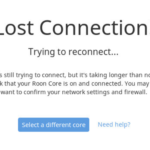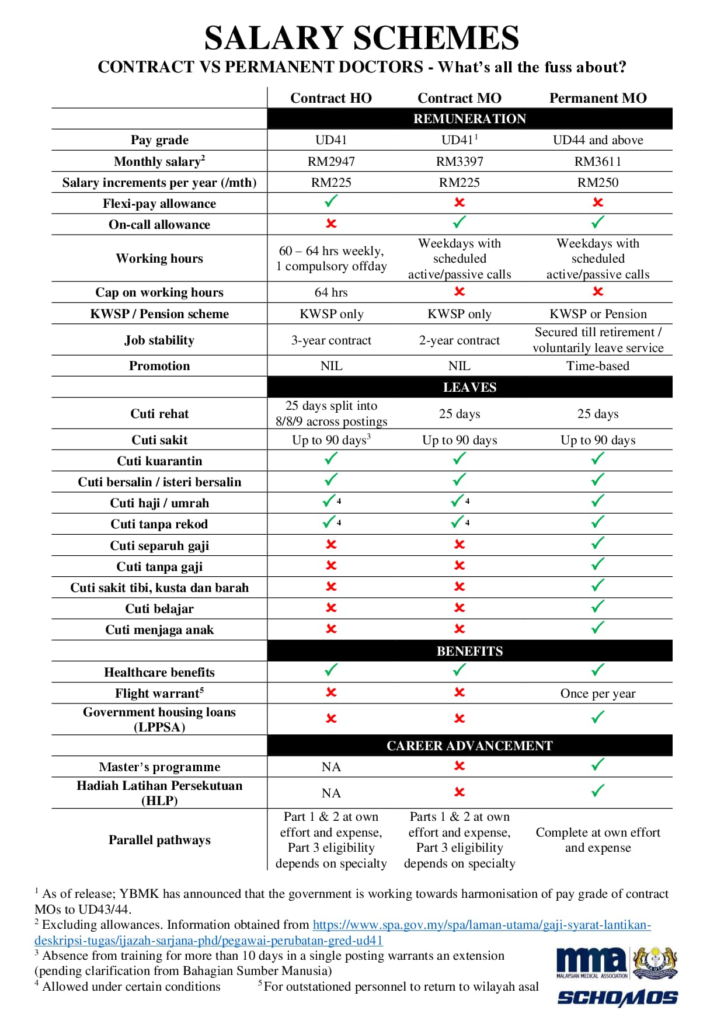
Why You Should/Shouldn’t Quit Housemanship
THE GREAT RESIGNATION (OF DOCTORS)
During the height of the COVID-19 pandemic, in August 2021, the United States met one of the highest rates of employees quitting their job: a whopping 4.3 million.
Quite recently, we have witnessed the catastrophe that has been impacting contract medical doctors in Malaysia, sending shockwaves nationwide:
In December 2016, the government had shifted its hiring policy from permanent appointment to contract appointment. With this implementation, we have witnessed contract doctors to be denied their basic right to equal pay, equal welfare benefits, and equal career opportunities.
Medical officers who have since entered the workforce are now employed on five-year contracts, with a service rank of UD41. They are paid RM664 (US$157) less per month and offered fewer benefits (such as childcare leave, educational leave, and leave for serious illnesses like cancer) than their permanent counterparts, despite sharing similar responsibilities in the workplace. They are also not eligible to join the local universities’ Masters programme for specialisation.
This has resulted a total of 234 medical graduates giving up their housemanship in 2016; 315 in 2017; and 303 in 2018.
More than 1,700 government doctors resigned over the last four years, says Deputy Health Minister, Datuk Dr Noor Azmi Ghazali.
“Based on the Health Ministry’s records, between 2017 and June this year, a total of 1,497 contract medical officers had resigned”. He said 110 medical officers resigned in 2017, 168 in 2018, 475 in 2019 and 511 last year. From January to November this year, 514 contract medical officers have resigned from their posts.

Quitting housemanship is like a taboo. We hear whispers about it behind closed doors but never in the open.
Being a doctor is a prestige and noble profession (it still is), so when someone decides to quit, it is equivalent to bringing shame or dishonor to the family, society and the country.
But I believe we shouldn’t box doctors into just one field — clinical. Even though you still get to retain your medical degree and your doctor title even after quitting housemanship, you’re essentially not a practicing, clinical doctor — you cannot treat patients.
THINGS TO CONSIDER BEFORE QUITTING
- Do you want to do clinical work? This means practicing as a doctor in hospitals or clinics and treating patients, this includes clinical research as well:
- If YES, then you have to continue housemanship to get a full MMC registration and do 2-years of compulsory service as a medical officer to get APC (annual practicing certificate). I will explain this further below.
- If NO, then probably you could consider searching for other alternative career options
- What kind of lifestyle do you aspire to have? Is it true life will get easier as you climb the medical ladder?
- What do you value — freedom of time for creative endeavors? Freedom to choose what, when and who to work with? Hence, is your career aligned to those values?
- What is your ikigai?
Below are reasons why you should or shouldn’t quit housemanship:
WHY YOU SHOULDN’T QUIT
- Housemanship: You need to complete housemanship in order to get MMC full registration. MMC is your license to practice in the country. Full registration is what allows you to practise as a doctor legally.
- Medical officer: You need to complete 2 years of compulsory service as a medical officer with KKM in order to get APC (annual practicing certificate). APC is an annually renewable practising certificate which requires you to renew yearly, by collecting 20 CPD points per year and get an indemnity insurance. This is to ensure doctors keep up to date.
Without housemanship (full MMC registration) and compulsory service (APC), your medical degree is just another degree. You can opt to apply for non-clinical Masters programme but you need to take into consideration: scholarship/fee of study, living cost during training, competition to apply as lecturer later etc.
To be a lecturer in basic sciences (anatomy, physiology, pharmacology etc), most universities prefer those with clinical experience. And you cannot become a lecturer in basic sciences with just a MBBS undergraduate medical degree.
WHY YOU SHOULD QUIT
If clinical work is not something you enjoy, then there’s no shame in admitting it. And choose to pivot.
Some people say strong people don’t quit, but I believe that it takes a stronger person to know when to quit.
Consider these questions: What are your values, and is your job aligned to them? What is your ikigai?
Your job takes up a huge chunk of your life, and life is too finite to be doing a job you despise. There are so many more alternatives if you choose to search deeply for them. It can range from medical or nonmedical related pathways, to clinical or non-clinical alternatives, whether it be health-related or non-health industries.
Below is a list of career alternatives that I have gathered for both medical and non-medical related pathways for those with a medical degree, but contemplating of resigning from housemanship. Most of these options, however, require that take a Masters degree or equivalent courses to get certified.
Feel free to do your own independent research for each option below.
MEDICAL-RELATED
1. Bioethics/Medical Law and Ethics
https://medicfootprints.org/a-guide-to-a-medico-legal-career-for-doctors/
2. Medical Affairs Advisor for pharmaceutical companies
3. Health Research Ethics
4. Health Management/Health Administration/Health Services & Hospital Management
5. Research (Clinical & Non-clinical)
6. Health Economics
7. Healthcare System Financing
8. Health System Planning (Health Policy and Management, Formulation and Development/Strategic Management of Clinical Services Delivery)
9. Clinical Informatics (Medical and Health Informatics / Bioinformatics)
10. Medical assessor and underwriter with insurance company
11. Liaison officer or sale representative in pharmaceutical or healthcare technology companies
12. Medical Education
https://medicfootprints.org/a-guide-to-a-career-in-medical-education/
https://www.mededworld.org/Home.aspx
13. Medical Writer
https://medicfootprints.org/medical-writer-career-guide/
14. Entrepreneurship – Especially in healthcare technology i.e. artificial intelligence and machine learning:
https://medicfootprints.org/health-tech-careers-for-doctors-guide/
https://medicfootprints.org/a-guide-to-a-career-as-a-doctor-entrepreneur/
Watch this Youtube video about a medical graduate pursuing healthcare technology: Leaving Medical School to Pursue a Different Career | Ep 19

NON-MEDICAL RELATED
Non-clinical alternatives can be health-related or non-health industries, and they can range from teaching and Information Technology (IT), to engineering and business or entrepreneurship.
It could be any career that is not clinical-related, essentially.
MEDIC FOOTPRINTS MALAYSIA
Medic Footprints Malaysia is a social enterprise ‘founded by doctors for doctors’. It is the only platform in Malaysia that addresses issues of alternative careers for medical doctors and assisting them in transitioning seamlessly to new professions.
They have a huge community of doctors to assist you in your search for an alternative career, and they held webinars regularly too, to provide you with insightful information on the endless possibilities of careers for medical doctors out there.
Consult Medic Footprints Malaysia for more information and guidance:
https://medicfootprints.com.my/
Career alternative suggestions by Medic Footprints Malaysia:
https://medicfootprints.org/category/articles/career-guides/
FINDING A CAREER SUITABLE FOR YOU
A career is not something you pick randomly without any considerations, just because it sounds nice and it seems cool. Choosing a career is more intricate than you think.
To know which career suits you, I believe we have to take into account multiple factors: personal interests, intentions, personality, values and desired lifestyle etc.
Below are some articles about finding a career that suits you:
https://medicfootprints.org/steps-to-building-an-outstanding-personal-brand-for-a-doctor/
https://www.themarginalian.org/2012/02/27/purpose-work-love/
http://www.paulgraham.com/love.html
Below are more resources about quitting housemanship:
https://pagalavan.com/education/for-future-doctors-what-if/
http://quittinghousemanship.blogspot.com/
https://fiholic.com/quit-housemanship/
CONCLUSION
On December 15, 1933, Jung responded to a woman by the name of Frau V., who had asked his guidance on, quite simply, how to live.
Jung writes:
Dear Frau V.,
Your questions are unanswerable because you want to know how one ought to live. One lives as one can. There is no single, definite way for the individual which is prescribed for him or would be the proper one. If that’s what you want you had best join the Catholic Church, where they tell you what’s what. Moreover this way fits in with the average way of mankind in general. But if you want to go your individual way, it is the way you make for yourself, which is never prescribed, which you do not know in advance, and which simply comes into being of itself when you put one foot in front of the other. If you always do the next thing that needs to be done, you will go most safely and sure-footedly along the path prescribed by your unconscious. Then it is naturally no help at all to speculate about how you ought to live. And then you know, too, that you cannot know it, but quietly do the next and most necessary thing. So long as you think you don’t yet know what this is, you still have too much money to spend in useless speculation. But if you do with conviction the next and most necessary thing, you are always doing something meaningful and intended by fate. With kind regards and wishes,
Yours sincerely,
C.G. Jung
Ultimately, there is no right or wrong way to live. Don’t fall into the comparison trap. You are only limited by your fears and self-beliefs.
With that, I’ve also prepared a FREE MINI COURSE for you on the steps that you can take before quitting housemanship. It comes with a worksheet too, as a guide to help you through the whole process.
I’ve gone through this course myself, and it has helped me tremendously. I hope it does for you as well.
Sign up below with your name and email, and get access to the FREE MINI COURSE!
I genuinely wish you nothing but the best in your endeavours. You got this

Hello! I am Christal
Interesting Posts


5 Things I Need To Change/Stop Doing in 2020


10 Things I’ve Learned After Quitting Housemanship

6 Reasons You Should (Consider) Quitting Your Job

5 Lessons I’ve Learnt In Medical School
Twenty years from now you will be more disappointed by the things that you didn’t do than by the ones you did do.
- Mark Twain Tweet
Related Articles

5 Signs You’re In The Right Career

6 Reasons You Should (Consider) Quitting Your Job

6 Steps To Take If You’re Planning To Quit Your Job






